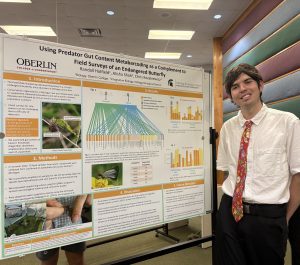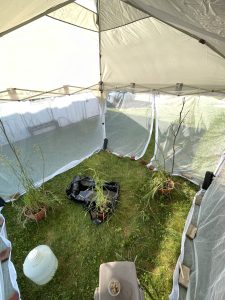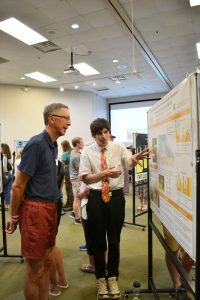As I wrap up my time at KBS, I have been reflecting on all that went on and what this experience has meant to me. I was initially drawn to KBS because it seemed like an institution with a long history of ecological work, a lot of which was focused on organisms and interactions that were pretty local. Having grown up in Ohio all my life, I was excited to see similarities and differences in wildlife and environment in a new state, while getting to work on a project relevant to species found around me.

The project
Within the program, I was specifically drawn to a project being run by Drs. Alisha Shah and Chris Kozakiewicz on the feeding behavior of the Eastern pondhawk, a common dragonfly species that seems to feed on the Poweshiek skipperling (a much, much less common butterfly) more than other predators. The Poweshiek skipperling is a critically endangered species only found at certain sites throughout Michigan, and the project aimed to evaluate pondhawk feeding behaviors, diet, and digestion using both field and bioinformatic methods. I was really excited about the project because it was a distinct intersection of a lot of my interests (conservation, genomics, science communication!) and I knew I had a lot to learn.

My project changed pretty starkly throughout my time at KBS. Initially, I was in the field catching live dragonflies to set up tests for captive care. This part turned out to be a lot trickier than I thought! Dragonflies are not easy at all to keep captive, and despite my own best efforts (with much appreciated support from my mentors and lab mates) even a 10’x10’ outdoor canopy did not work out for them. Eventually, given time constraints and lack of survival improvement, we ended up making the decision to pivot from this to a new but related project.
Failure can be challenging, and it was frustrating not knowing exactly what was going wrong with our experimental setup. Thankfully, both of my mentors were very willing to support me in developing a backup, which would still add some insight to the pondhawk-Poweshiek relationship computationally. For the rest of the summer, I have been analyzing sample sequences from a group of 16 pondhawks collected in 2022. The goal of this new work was to confirm the effectiveness of dragonfly predators as a supplementary tool to field surveys for the Poweshiek skipperling, and potentially other endangered butterflies as well. As someone interested in computer science, these analyses were a great opportunity to learn a lot about bioinformatics computing in a very short time. I had the opportunity to use MSU’s high-performance computing cluster to run some of the processes, which not only feels cool to say but also gave me some really interesting results (including Poweshiek skipperlings!) on the very wide variety of prey that pondhawks are eating out in nature. If it flies, they can hunt it!
Outcomes

This experience meant a lot to me. I was really passionate about my project and I’m happy about how it turned out, but even outside of that I gained a lot from KBS. Coming from a small school background, I got the chance to engage with a lab made up of people at all stages in their careers, and see the spirit of collaboration that arises in the lab setting. There were also so many resources available to us, like weekly seminars and practice writing to help us learn more about what it means to work professionally in science.
I went into my REU interested in research, but not knowing particularly well what I wanted my career path to be, but having the opportunity to meet with my mentors and peers taught me a lot about grad school and working in science. I am happy about the work I ended up producing here, and excited to have some added clarity on what could come next.
~~~~~~~~~~~~~~~~~~~~
Randall Hatfield is a student at Oberlin College. During his summer at KBS, his mentors were Alisha Shah and Chris Kozakeiwicz in the Shah/Kozakiewicz Lab.
Randall’s KBS summer was funded by the Doug and Maria Bayer W.K. Kellogg Biological Station Research Experience Award.
~~~~~~~~~~~~~~~~~~~~

A legacy of conservation; a commitment to sustainability.
3700 E. Gull Lake Drive
Hickory Corners, MI 49060
(269) 671-5117
info@kbs.msu.edu